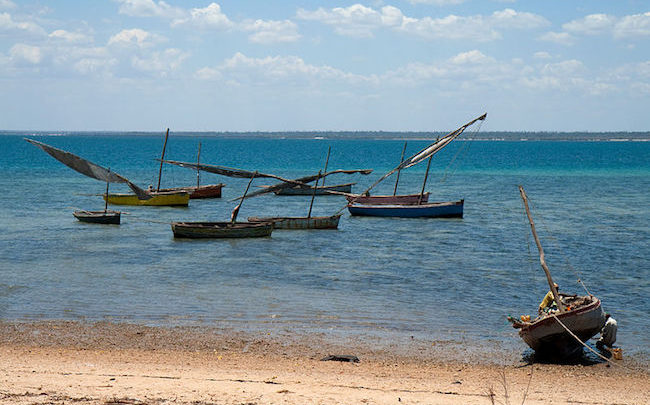Battleground Mozambique: China versus the U.S.
Mozambique is an unlikely center of the China-Western superpower rivalry.

By Philip M. Griffin
The southern African coastal nation is one of the world’s most impoverished, but it also has substantial natural resources. Mozambique’s 1,400 miles of coastline, nearly as long as the U.S. eastern seaboard, includes untapped reserves of natural gas as well as waters loaded with tuna and other seafood. These assets have the potential to transform the nation into a regional powerhouse.
Mozambique’s enormous, 165 trillion cubic foot offshore Rovuma natural gas deposits, discovered a decade ago, are worth an estimated 50 times Mozambique’s entire Gross Domestic Product of about $13 billion. Its fisheries also have vast potential to both feed and employ Mozambique’s people.
Spurred by the need to protect and capitalize on its fish and natural gas opportunities, Mozambique’s government, to great fanfare, launched series of maritime projects earlier this decade to build a modern fishing fleet and coastal security system. The plan included building a modern ship repair facility to support its fishing and security fleet and also to service vessels from other nations sailing the Indian Ocean.
The shipbuilder, Privinvest, delivered the vessels, systems and equipment. But for reasons still largely unexplained, Mozambique authorities abandoned the projects, defaulted on the $2 billion in debt funding the projects, and lost favored status with the International Monetary Fund.
It’s uncertain whether anyone is staffing, operating or servicing the abandoned, so-called “ghost fleet of Mozambique.” Meanwhile, of the 130 vessels licensed for tuna fishing in Mozambique’s waters, reportedly only one is Mozambican.
China is taking advantage of Mozambique’s moribund fishing fleet and industry, emerging as the leading fishing force in Mozambique waters behind only Spain and Portugal. According to a United Nations report, China’s share of the Mozambique tuna fishing grew by an average annual rate of nearly 67 percent from 2002 to 2014.
China’s plundering of Mozambique’s waters has continued to surge. Last November, Chinese officials and their state-sponsored fishing industry held a major ceremony celebrating the return of six Chinese fishing trawlers from Mozambique with nearly 360 tons of fish and crustaceans.
China, which consumes more than a third of the world’s fish and worries about declining domestic catches, is investing heavily in “distant-water” fishing. The Chinese firm that sent the trawlers to Mozambique recently built 12 new vessels, boosting its overseas fishing fleet to 18 boats large and powerful enough to make the 3,700-mile trip with hundreds of tons of seafood.
Mozambique unfortunately enables China’s domination of its fisheries by licensing Chinese trawlers, as it gives up countless jobs and billions of dollars in revenues by not having its own fishing fleet.
Worse, Mozambique loses from the rampant illegal fishing with bold impunity by unlicensed vessels—including from China—because it lacks the maritime security forces to patrol and police its waters.
Meanwhile, as they try to compete with the Chinese in Africa, U.S. and Western nations are concerned about doing business in Mozambique and other nations with a history of turmoil, instability, corruption and lack of transparency.
Americans doing international business can also face allegations of violating the Foreign Corrupt Practices Act if they make payments that the U.S. deems to be bribery. Other nations might call them fees. The Chinese appear less concerned about such Western business strictures.
Aside from the China-Western competition for commerce and trade, Mozambique also plays a key geostrategic role due to its extensive Indian Ocean coastline. For centuries, since humans first built boats, the Indian Ocean has been a global pivot point and sometimes a flash point.
Today, the U.S. places so much strategic importance on safeguarding the Indian Ocean that the U.S. Africa Command, dedicated to maintaining military relations with the 53 African nations and fighting regional conflicts, recently launched the “Cutlass Express” naval exercise.
While China is not a military threat, the U.S. is concerned that it could leverage its commercial dominance in Africa into strategic dominance in the East-West power struggle. Some security experts are even warning African nations, especially coastal countries, to avoid being too dependent on China.
China has more than 100 companies and millions of citizens in Africa while it’s investing billions of dollars and pursuing aggressive commercial diplomacy on the continent. Amid the escalating U.S.-China trade tensions, President Donald J. Trump’s administration recently launched a “Prosper Africa” initiative at the U.S.-Africa Business Summit in Mozambique’s capital of Maputo. Trump’s team hopes to challenge China’s growing commercial dominance in Africa by doubling U.S.-African trade.
Mozambique is a major strategic battleground in U.S.-China trade, influence and dominance in Africa. By blowing the dust off, powering up and harnessing the fishing and security fleet it already has, it can take back what it rightfully owns and cool East-West friction.
Philip M. Griffin is a former senior staffer responsible for African policy on the Senate Foreign Relations Committee.






